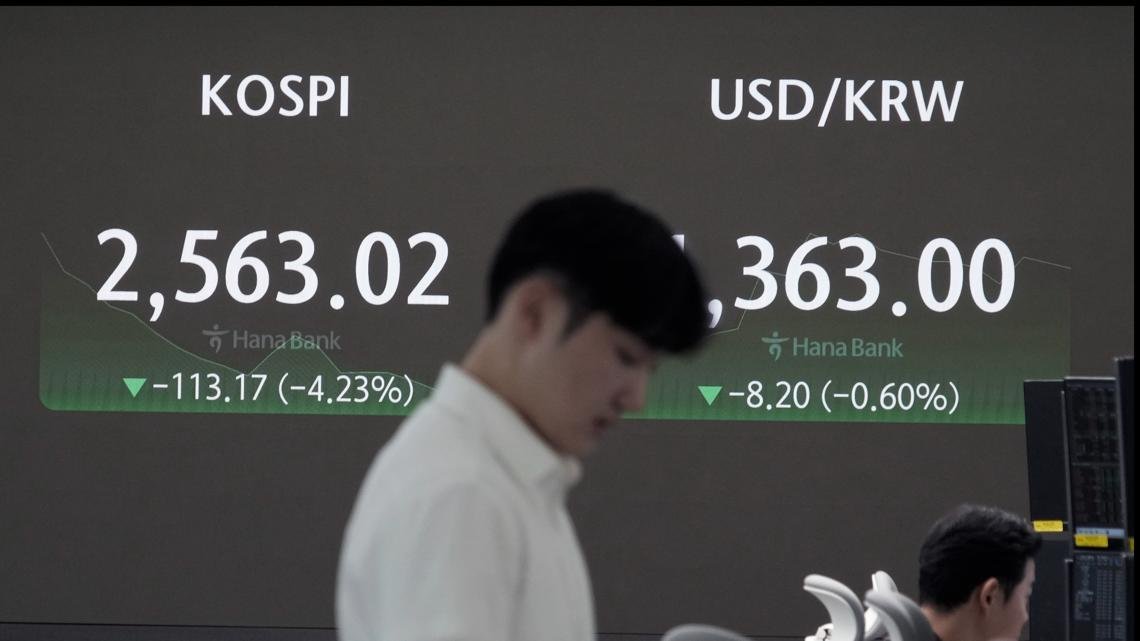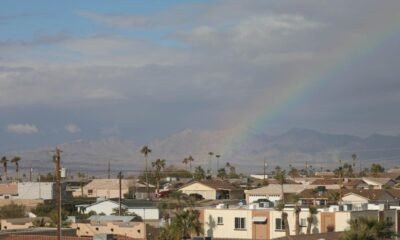Business
Dow Plunges 860 Points as Japanese Stocks Face Worst Crash Since 1987 Amid U.S. Economy Fears

Worries persist following a dismal Friday report that revealed U.S. employers scaled back hiring last month more than anticipated.
NEW YORK — Fear of a sluggish U.S. economy has triggered a global sell-off, causing Wall Street to plunge Monday. Concerns escalated, with markets across the globe reacting in kind.
By midday, the S&P 500 had dropped 2.4%, poised for its worst day since 2022. The Dow Jones Industrial Average plummeted by 864 points, or 2.2%, while the Nasdaq composite tumbled 2.7%.
The declines extended losses from last week. Japan’s Nikkei 225 experienced a 12.4% nosedive, the steepest fall since the 1987 Black Monday crash.
This was Tokyo’s first response to Friday’s U.S. employment data. The weak hiring numbers amplified fears that the Federal Reserve’s aggressive rate hikes might have overstepped, potentially choking economic activity to rein in inflation.
Professional investors warned that technical factors may be intensifying market actions but noted the volatility is striking. South Korea’s Kospi index slumped 8.8%, European markets fell over 2%, and Bitcoin nosedived from above $61,000 to below $55,000.
Even gold, typically a safe haven in uncertainty, declined by 1%.
Speculation arose that the damage might force the Federal Reserve into an emergency rate cut before its scheduled meeting on Sept. 18. The yield on the two-year Treasury briefly fell below 3.70% but recovered to 3.90% after dropping from 3.88% late Friday and 5% in April.
“The Fed could rush in with a massive rate cut, but the case for an inter-meeting cut is weak,” said Brian Jacobsen, chief economist at Annex Wealth Management, pointing out that such measures are typically reserved for crises like COVID-19 rather than a 4.3% unemployment rate.
The U.S. economy continues to grow, with a recession not yet certain. The Federal Reserve aims to balance slowing the economy to manage inflation without causing a downturn.
Goldman Sachs economist David Mericle raised the likelihood of a recession in the next 12 months to 25% from 15%, following the jobs report. Yet, he believes the data are generally positive and sees no major financial imbalances.
Recent Wall Street declines may also partly be a correction from the stock market’s surge to record highs this year, buoyed by enthusiasm for artificial intelligence and expected interest rate cuts. Critics argue the market was overvalued.
“Markets climb gradually but can plummet suddenly,” said JJ Kinahan, CEO of IG North America, attributing the recent market jitters to waning AI excitement and an overvalued market.
The Bank of Japan’s recent rate hike from nearly zero put additional pressure on global markets. This move boosted the yen but caused traders to rethink investments financed with low-cost Japanese loans.
U.S. stocks trimmed losses after unexpectedly strong U.S. services sector growth data was released. The growth, driven by the arts, entertainment, recreation, accommodation, and food services sectors, helped stabilize Treasury yields.
Nonetheless, stocks of economically sensitive companies took a hit, with the Russell 2000 index plummeting 3.7%.
Adding to Wall Street’s woes, Big Tech stocks also fell. Major players like Apple and Nvidia, part of the “Magnificent Seven” that propelled the S&P 500 to records, saw significant declines as high-interest rates and profitability concerns weighed down enthusiasm.
Apple saw a 3.2% drop after Warren Buffett’s Berkshire Hathaway revealed it reduced its stake in the company.
Nvidia, a key player in the AI boom, fell 5% after analysts forecasted lower profits due to reported delays in its new AI chip. Nvidia’s annual gains have now been cut from 170% to 106%.
Since the Magnificent Seven companies hold significant market value, their stock movements heavily influence major indexes like the S&P 500.
Beyond corporate profits and economic concerns, geopolitical developments add to market volatility. The Israel-Hamas conflict could cause fluctuations in oil prices, while global hotspots and upcoming U.S. elections introduce additional uncertainties.
The turmoil impacts Wall Street’s outlook and Vice President Kamala Harris’ defensive stance amid recession threats. Meanwhile, former President Donald Trump may need to shift his narrative from inflation to economic revival in light of slower growth.


















